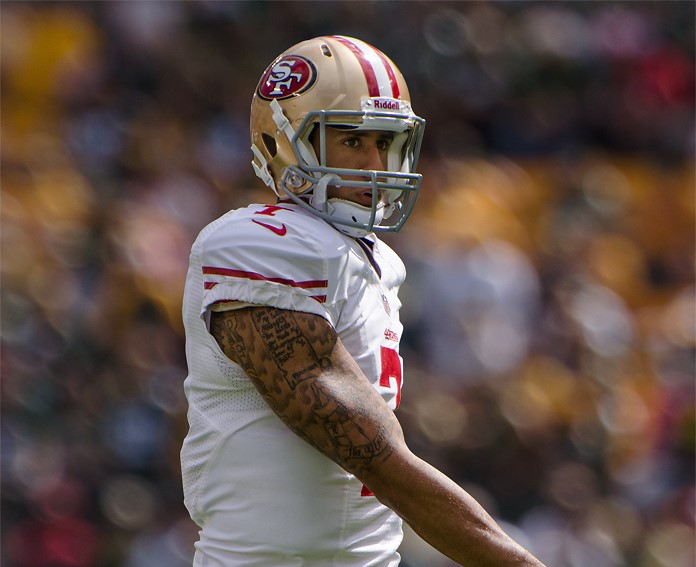Former San Francisco 49ers quarterback Colin Kaepernick first refused to stand during a pregame performance of the national anthem under the Obama administration in 2016. His protest was against racial inequality and police brutality; he would not “stand up to show pride in a flag for a country that oppresses black people and people of colour” and would continue to protest until “[the American flag] represents what it’s supposed to represent.” During the course of the year, he was joined by others in NFL and other sports teams. This week more than 200 players joined him in response to Trump calling for protesting athletes to be sacked. Kaepernick has remained unsigned after his departure from the San Francisco 49ers, clearly for political reasons.
Trump’s words were characteristically despicable, calling the protesting athletes – who are overwhelmingly black – “son[s] of bitch[es]”. Many have been quick to point out that Trump used far harsher words to describe black athletes exercising their First Amendment right than he used in his speech ‘condemning’ the neo-Nazi terrorists in Charlottesville. Since then, over 200 NFL athletes – and a wave of suddenly sympathetic NFL owners – have responded by kneeling, locking arms, or staying in the locker room during the playing of the national anthem.
Whilst this show of solidarity has long been necessary, there has been a concentrated effort to detract from Kaepernick’s point. His message was about the issue of systemic racism, in particular against the black community and the issue of police brutality. An effect of Trump’s comments has been the dilution and outright erasure of this message. Some have taken the #TakeAKnee protest and reframed it as an anti-Trump protest whilst others – predictably, those on the right – have condemned it as an unpatriotic protest against America and the anthem.
Diluting Kaepernick’s message – finding the lowest common denominator in order to reach some semblance of a semi-liberal consensus and presenting it as simply a movement ‘against Trump’ does him a disservice. His message was concentrated and poignant: a refusal to honour a flag that “oppresses black people and people of colour” and a condemnation of police killings of unarmed black boys and men. For NFL owners – who have blackballed him for his stance – to now step in after Trump’s condemnation, and link arms in a show of some vague concept of “unity” (especially in the face of Dan Snyder’s $1 million donation to Trump) is a whitewash of Kaepernick’s bold stance against systemic racism. This coopting of the narrative is both empty and dangerous.
Simultaneously, the rightwing reframing of the protest as ‘unpatriotic’ is extremely telling. It highlights the fact that for many white Americans on the right, there is no ‘acceptable’ way for black Americans to protest – even a display of peaceful protest is deemed unpatriotic. The hypocrisy couldn’t be more obvious: Trump and his supporters wanting US citizens to be punished for exercising a right embedded in the US Constitution. This can be read as two things. Firstly, as a broader statement against free speech (which, ironically, has long been a battleground for the right) in the face of blind “patriotism”, and secondly, as white nationalists affirming a core belief: that non-white Americans (even revered sports celebrities) are second-class citizens, to whom the right to nonviolent political dissent does not apply.
This brings the discussion onto race, which is really what it has always been about. Kaepernick started this in order to force people to confront the issue of racism and police brutality. Tellingly, many conservatives and Trump supporters have recast this issue – a protest against systemic racism – as being a protest against America. The parallel drawn – albeit unintentionally – is searing. America is a nation built on the enslavement of black people, and following emancipation, their structural oppression (from Jim Crow laws, voter disenfranchisement and lynchings to police brutality and mass incarceration). Historically, anti-blackness is as American as apple pie. Through layering narrative on narrative, we risk distortion: Kaepernick’s stance was an unflinching move to force many Americans to confront the systemic inequalities of their country. Instead, they changed the channel.
Image: Mike Morbeck via Flickr

